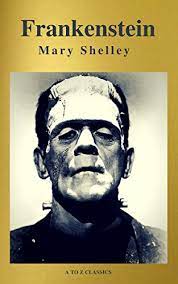Frankenstein Page #12
Frankenstein; or, The Modern Prometheus is an 1818 novel written by English author Mary Shelley. Frankenstein tells the story of Victor Frankenstein, a young scientist who creates a sapient creature in an unorthodox scientific experiment
No one can conceive the variety of feelings which bore me onwards, like a hurricane, in the first enthusiasm of success. Life and death appeared to me ideal bounds, which I should first break through, and pour a torrent of light into our dark world. A new species would bless me as its creator and source; many happy and excellent natures would owe their being to me. No father could claim the gratitude of his child so completely as I should deserve theirs. Pursuing these reflections, I thought that if I could bestow animation upon lifeless matter, I might in process of time (although I now found it impossible) renew life where death had apparently devoted the body to corruption. These thoughts supported my spirits, while I pursued my undertaking with unremitting ardour. My cheek had grown pale with study, and my person had become emaciated with confinement. Sometimes, on the very brink of certainty, I failed; yet still I clung to the hope which the next day or the next hour might realise. One secret which I alone possessed was the hope to which I had dedicated myself; and the moon gazed on my midnight labours, while, with unrelaxed and breathless eagerness, I pursued nature to her hiding-places. Who shall conceive the horrors of my secret toil as I dabbled among the unhallowed damps of the grave or tortured the living animal to animate the lifeless clay? My limbs now tremble, and my eyes swim with the remembrance; but then a resistless and almost frantic impulse urged me forward; I seemed to have lost all soul or sensation but for this one pursuit. It was indeed but a passing trance, that only made me feel with renewed acuteness so soon as, the unnatural stimulus ceasing to operate, I had returned to my old habits. I collected bones from charnel-houses and disturbed, with profane fingers, the tremendous secrets of the human frame. In a solitary chamber, or rather cell, at the top of the house, and separated from all the other apartments by a gallery and staircase, I kept my workshop of filthy creation; my eyeballs were starting from their sockets in attending to the details of my employment. The dissecting room and the slaughter-house furnished many of my materials; and often did my human nature turn with loathing from my occupation, whilst, still urged on by an eagerness which perpetually increased, I brought my work near to a conclusion. The summer months passed while I was thus engaged, heart and soul, in one pursuit. It was a most beautiful season; never did the fields bestow a more plentiful harvest or the vines yield a more luxuriant vintage, but my eyes were insensible to the charms of nature. And the same feelings which made me neglect the scenes around me caused me also to forget those friends who were so many miles absent, and whom I had not seen for so long a time. I knew my silence disquieted them, and I well remembered the words of my father: “I know that while you are pleased with yourself you will think of us with affection, and we shall hear regularly from you. You must pardon me if I regard any interruption in your correspondence as a proof that your other duties are equally neglected.” I knew well therefore what would be my father’s feelings, but I could not tear my thoughts from my employment, loathsome in itself, but which had taken an irresistible hold of my imagination. I wished, as it were, to procrastinate all that related to my feelings of affection until the great object, which swallowed up every habit of my nature, should be completed. I then thought that my father would be unjust if he ascribed my neglect to vice or faultiness on my part, but I am now convinced that he was justified in conceiving that I should not be altogether free from blame. A human being in perfection ought always to preserve a calm and peaceful mind and never to allow passion or a transitory desire to disturb his tranquillity. I do not think that the pursuit of knowledge is an exception to this rule. If the study to which you apply yourself has a tendency to weaken your affections and to destroy your taste for those simple pleasures in which no alloy can possibly mix, then that study is certainly unlawful, that is to say, not befitting the human mind. If this rule were always observed; if no man allowed any pursuit whatsoever to interfere with the tranquillity of his domestic affections, Greece had not been enslaved, Cæsar would have spared his country, America would have been discovered more gradually, and the empires of Mexico and Peru had not been destroyed. But I forget that I am moralizing in the most interesting part of my tale, and your looks remind me to proceed. My father made no reproach in his letters and only took notice of my silence by inquiring into my occupations more particularly than before. Winter, spring, and summer passed away during my labours; but I did not watch the blossom or the expanding leaves—sights which before always yielded me supreme delight—so deeply was I engrossed in my occupation. The leaves of that year had withered before my work drew near to a close, and now every day showed me more plainly how well I had succeeded. But my enthusiasm was checked by my anxiety, and I appeared rather like one doomed by slavery to toil in the mines, or any other unwholesome trade than an artist occupied by his favourite employment. Every night I was oppressed by a slow fever, and I became nervous to a most painful degree; the fall of a leaf startled me, and I shunned my fellow creatures as if I had been guilty of a crime. Sometimes I grew alarmed at the wreck I perceived that I had become; the energy of my purpose alone sustained me: my labours would soon end, and I believed that exercise and amusement would then drive away incipient disease; and I promised myself both of these when my creation should be complete. Chapter 5 It was on a dreary night of November that I beheld the accomplishment of my toils. With an anxiety that almost amounted to agony, I collected the instruments of life around me, that I might infuse a spark of being into the lifeless thing that lay at my feet. It was already one in the morning; the rain pattered dismally against the panes, and my candle was nearly burnt out, when, by the glimmer of the half-extinguished light, I saw the dull yellow eye of the creature open; it breathed hard, and a convulsive motion agitated its limbs.
Translation
Translate and read this book in other languages:
Select another language:
- - Select -
- 简体中文 (Chinese - Simplified)
- 繁體中文 (Chinese - Traditional)
- Español (Spanish)
- Esperanto (Esperanto)
- 日本語 (Japanese)
- Português (Portuguese)
- Deutsch (German)
- العربية (Arabic)
- Français (French)
- Русский (Russian)
- ಕನ್ನಡ (Kannada)
- 한국어 (Korean)
- עברית (Hebrew)
- Gaeilge (Irish)
- Українська (Ukrainian)
- اردو (Urdu)
- Magyar (Hungarian)
- मानक हिन्दी (Hindi)
- Indonesia (Indonesian)
- Italiano (Italian)
- தமிழ் (Tamil)
- Türkçe (Turkish)
- తెలుగు (Telugu)
- ภาษาไทย (Thai)
- Tiếng Việt (Vietnamese)
- Čeština (Czech)
- Polski (Polish)
- Bahasa Indonesia (Indonesian)
- Românește (Romanian)
- Nederlands (Dutch)
- Ελληνικά (Greek)
- Latinum (Latin)
- Svenska (Swedish)
- Dansk (Danish)
- Suomi (Finnish)
- فارسی (Persian)
- ייִדיש (Yiddish)
- հայերեն (Armenian)
- Norsk (Norwegian)
- English (English)
Citation
Use the citation below to add this book to your bibliography:
Style:MLAChicagoAPA
"Frankenstein Books." Literature.com. STANDS4 LLC, 2025. Web. 22 Jan. 2025. <https://www.literature.com/book/frankenstein_1446>.




Discuss this Frankenstein book with the community:
Report Comment
We're doing our best to make sure our content is useful, accurate and safe.
If by any chance you spot an inappropriate comment while navigating through our website please use this form to let us know, and we'll take care of it shortly.
Attachment
You need to be logged in to favorite.
Log In